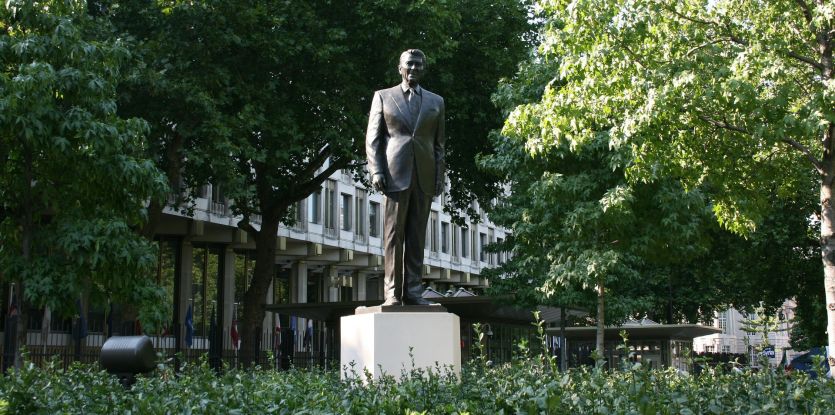The Changing World
I began my writing career the year Ronald Reagan was first elected President.
The year was 1980. Before fax machines, internet, e-mails, palm pilots, cell phones and many of the other amenities that have since changed our daily lives.
That year I became the chief writer and publisher of the Rebbe’s talks. It was difficult but rewarding work. Particularly on Shabbat and holidays, when notes and recordings are prohibited, our small team had to absorb hours – often five or more hours – of dense dissertations delivered by the Rebbe. We then had to recreate, research, annotate and document these teachings for posterity.
The grueling work, the pressure, the intensity required to reproduce profound ideas from memory is impossible to describe. But as challenging as it was, the reward was equally exhilarating. My work during those years literally transformed me as a human being, and defined my life until this day.
Try remembering hours of deep conversation on diverse topics – from philosophy to law, from Biblical interpretation to psychological application, from the nuances of mysticism to the intricacies of Talmud. Add to the equation a human and historical dimension. This and more is what we had to capture on paper on a weekly basis.
One of the critical things I learned, quite unexpectedly, during the years of my work was the intimate relationship between Torah thought and world events; the absolute necessity to integrate spiritual and secular developments.
In the evening prayer we say that Torah is “our life and sustenance.” It is therefore inconceivable to divorce spiritual life from our daily experiences, both on a personal and global level.
So, during my work in those years, as immersed as our staff would be in the inner workings of Torah scholarship, I always kept my eyes open at national and global events of the time.
In retrospect the 80’s were pioneering years.
Information technology – the processing and distribution of information – was literally revolutionized. I can personally attest to the far-reaching implications of the transition from the typewriter to the word processor. No longer would we need to retype text. Once typed, all you needed to do was edit the same file. This literally cut out two days of work in producing our publications.
With the advent of the fax machine and then broadcast fax, immediate distribution of material became possible.
Then, of course, in the 90’s, the Internet and the worldwide web made distribution literally seamless. – Some of you may be surprised to know that preceding the web we were using, for a short time, a thing called a BBS (bulletin board system), where data was posted and could be retrieved via telephone line.
But beyond technology there was perhaps an even more important revolution in the making: The bloodless fall of Communism. This fall, which finally happened in 1990, would bring freedom to hundreds of millions of people in Eastern Europe, Russia and all the former Soviet satellites.
While all this was incubating, I was preparing for publication week after week, visionary teachings that were addressing, amongst many things, the very issues that were evolving and emerging in the world around us. A true visionary, the Rebbe had that keen perspective that recognizes the underlying historical patterns and spiritual trends of local, national and global events.
At the time, the work was so consuming, I didn’t fully appreciate the magnitude of this wisdom nor recognize its relevance to current events. Like it is with all things close up, you can’t appreciate them until you step back and look at them from a bird’s eye view.
Now, in retrospect, and with a few more maturing years and experience under my belt, I marvel at the foresight of those teachings. Today, they resonate more than ever.
Among the major themes we explored back then in the Reagan years were issues like America’s role, the meaning of prosperity, the significance of technology – and how all these contemporary forces need to be harnessed to serve a spiritual objective. Another major issue was of course the role of Israel and the Jewish people in this increasingly emancipated world.
I’ll never forget one of the talks we were working on in 1980. It addressed the issue of America’s role in the world today. Clearly recognizing the acceleration of American prosperity, the Rebbe discussed the necessity for America to reaffirm – and reclaim – its essential roots. Those roots being the belief in the fundamental principles of freedom: that all people are created equal, and by their Divine virtue have inalienable rights.
American currency – the symbol of all things material – carries this message etched in the very fabric of our coins and bills: In God We Trust, E Pluribus Unum (from many, one).
The only preemptive antidote to the inevitable indulgence and greed resulting from prosperity and material comforts is to passionately embrace the principles of accountability to a Higher authority, and to commit with total dedication to our higher calling and mission in life. This is the only measure that has the power to counteract the seductive appeal of material success, which left on its own can feed narcissism and lead to corruption and self-destruction.
And then of course, mention must be made of the many talks in the 80’s regarding the state of Soviet Jewry – millions of people who suffered most severely under some seven decades of Soviet oppression. There was barely a farbrengen (gathering) that did not make mention of the plight of Soviet Jewry. As the 80’s wore on, the Rebbe specifically stated that Communism would crumble, and the Jews would finally be freed.
As the nation and the world now look back at the Reagan presidency, and people pour out their hearts in mourning, many are wondering what exactly was it about President Reagan that enamors so many.
Based on the teachings that I was working on in the Reagan years, allow me to submit several major points that stand out from those days:
President Reagan’s steadfast commitment to his principles – to the principles upon which this country was founded. Reagan was an authentic man of faith. He may not have been committed to formal religion, but he believed in G-d and was not ashamed to state his belief.
He was a man of vision, of dreams. And he never compromised them. Not a small achievement for a man of age – to not give up on the idealism of his youth. How many people do you know like that?
Even those that passionately disagreed with his politics admired his personality. Time and again you hear that he was simply a mentsch.
Reagan was a major cause responsible for the fall of Communism and the end of the Cold War. I know that debates rage whether this is true. But let’s face it. We always give credit to the President or leader in place for events (both successes and failures) that occur under his tenure. Obviously there are many factors that contribute to any major event, but one important factor has to include the leader of the time. You can always say that the successes during World War II would have happened under any President, even if it weren’t FDR. Yet, historically we always credit the leader in each respective time.
The fact is that Reagan stood strong for his principles, did not cower, and Communism did fall, without a shot being fired.
Finally, we hear about Reagan’s ability to inspire people. His communication skills were formidable. “The great communicator” he was called. His wit, humor and just plain decency came through and touched people. He gave people hope. He made you feel confident. As one mourner said: “He made me feel proud to be an American.”
Some have written that a great leader is not necessarily one who does great things, but one who inspires others to do great things.
Even historian Arthur Schlesinger Jr., who is not a Reagan fan, writes that President Reagan had “the vision thing in abundance.” He quotes a foreign visitor as commenting: “Maybe he didn’t know how to run a government, but he knew how to lead a people.”
Quite a compliment. If Reagan had no other quality than his ability to lead and infuse people with confidence this alone would make him one of the greatest leaders in history.
Frankly, I don’t fully understand the antagonism of some of those that disagree with Reaganomics or other of his policies. Even if you disapprove of his policies, and even if you’re right, isn’t it possible that he was a good man, with homey values, with conviction and beliefs that changed the world in which we live?
My objective is not to defend or represent the late president. Rather it is to glean lessons from current events that we can apply to our lives today. Based on the principle of Hashgacha Protis (Divine Providence), much can be learned from the popularity of Ronald Reagan – lessons that I personally was blessed to be privy to as my appreciation grows, in retrospect, for the teachings that we wrote and published back in the Reagan years.
If it can be summed up in a few words, the underlying message we were developing in the Reagan era included the following points:
- The power of the human spirit: Everything is possible if you set your mind to it.
- The critical need to counter the material tentacles of prosperity with a deep sense of spiritual vision and purpose.
- The need for America to live up to its founding principles. Namely, in G-d we Trust, and G-d endowed all human beings with inherent rights and freedoms.
- These are not American, but Divine principles. Principles given to all nations of the world. We must do everything possible to encourage – with compassion and resolve – that all nations embrace the Divine principles.
- To prepare ourselves and the world, including the former Soviet Union, to live up to our Divine responsibility by committing to the universal Divine laws of civilization.
Of all the lessons for our times perhaps the most powerful one is the relentless confidence that we can overcome our challenges, and never waiver in our conviction to transform the often heartless material world into a spiritual habitat.
This message calls out to us from this week’s Torah portion. Moses sends scouts to check out the Promised Land. They return with a terrible report: We cannot enter the Land of Israel, for it is a “land that consumes its inhabitants.” On that tragic day (Tisha B’Av) they incited the Jewish nation to reject the land promised to them and their ancestors by G-d.
Their grave sin stemmed, ironically, from their deep piety and spirituality. They could not fathom how they would be able to overcome the challenges of material existence. And they were unwilling to risk it. Instead they preferred to live in the spiritual oasis in the Sinai wilderness, protected by the Divine clouds, provided for by G-d with all their needs.
What then was their transgression? They challenged the very essence of the purpose of existence: The need to enter a hostile material world and transform it into a sacred place. We humans have no right to question whether this is possible; our job is to figure out how to fulfill this mission, never to wonder whether it was possible. The scouts were charged with exploring methods how to conquer the land. They in turn challenged the entire premise of possibility. That is tantamount to challenging G-d Himself, saying that G-d cannot empower us with the ability to face a powerful material world. G-d said “I give you life and tell you that you can overcome any challenge,” but the scouts defied that by declaring “No, we cannot overcome a land that consumes it’s inhabitants”!
The lesson is clear: One of the great possible curses in life is self-doubt. Fear and insecurity affect every one of our choices. It demoralizes you with a sense of resignation and fatalism.
The scouts (with all their good intentions) opened up the accursed door of self doubt. Therein lies their grave sin.
We must do everything to learn from their mistake, and never allow ourselves to succumb to fear and unsurety whether we can accomplish our mission in life.
Conversely, perhaps the greatest gift one can give another is: HOPE. Belief in yourself and in your ability to overcome any challenge.
Once you feel empowered everything else follows.
Ask yourself: do the people around me bolster my self-confidence or feed my insecurities? Do they make me feel strong or weak; empowered or disempowered?
While you are already asking the question, you might as well also consider whether you are a person who give others hope?
It’s a mirror image: Confidence breeds confidence; security feeds security. You usually make others feel as you are; you project what you are and you are what you project. Confident and secure people make others feel the same. Insecure people make others feel insecure.
Test it.
Find people that give you hope. People that feed your confidence.
The fall of the powerful Soviet Union is one contemporary example of what resolve can accomplish.
Everything is possible. Everything.
So where does this power of confidence come from? Read next week’s article.








Dear Rabbi,
However we describe the sin of the spies, the Reagan leadership was its antithesis. Squarely facing the threat of the Soviet Union was definitely the courageous act required by the situation. The sin of the spies was a major sin not a minor because courage was not an option in the situation but a requirement.